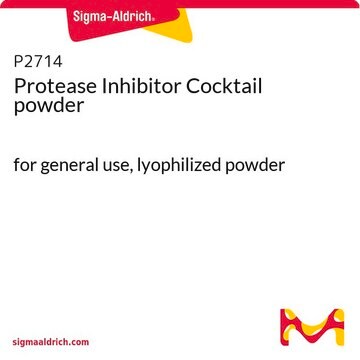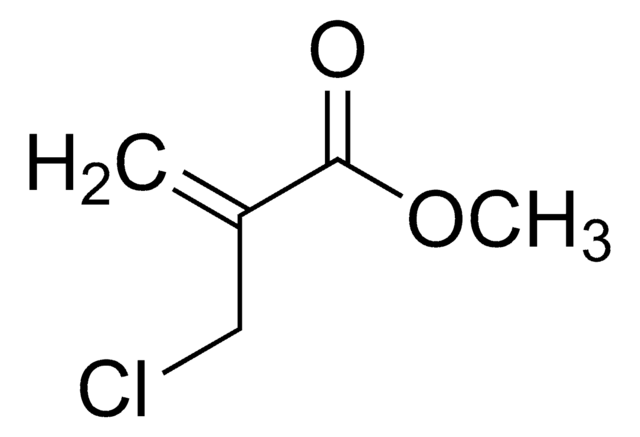MSSAFE
Protease and Phosphatase Inhibitor Cocktail
MS-SAFE, powder, Protease inhibitors: serine, cysteine and aspartic proteases and metalloproteases. Phosphatase inhibitors: tyrosine, serine/threonine, acid and alkaline phosphatases.
Sinónimos:
Mass Spectrometry Safe Protease and Phosphatase Inhibitor Cocktail
About This Item
Productos recomendados
product name
MS-SAFE Protease and Phosphatase Inhibitor,
description
for use with mammalian cell and tissue extract, lyophilized powder
form
powder
solubility
water: 0.1 g/mL, clear, colorless
storage temp.
2-8°C
General description
- Serine, cysteine and aspartic proteases, and metalloproteases
- Tyrosine, serine/threonine, acid and alkaline phosphatases
Specificity
Phosphatase inhibitors: tyrosine, serine/threonine, acid and alkaline phosphatases
Application
Features and Benefits
Compatible with downstream sample processing such as His-tagged protein purification and phosphopeptide enrichment
Allows accurate measurement of protein activity and identification of phosphorylation sites.
Components
- Bestatin hydrochloride
- Leupeptin
- Phosphoramidon disodium salt
- Pepstatin A
- Elastatinal
- Aprotinin
- Nafamostat mesylate
- Antipain
- Okadaic acid
- Sodium fluoride
- Sodium orthovanadate
- Bromotetramisole oxalate
- β-lactose
- DL-leucine
Quantity
Physical form
signalword
Warning
hcodes
Hazard Classifications
Acute Tox. 4 Oral - Eye Irrit. 2 - Skin Irrit. 2
Storage Class
11 - Combustible Solids
wgk_germany
WGK 3
flash_point_f
Not applicable
flash_point_c
Not applicable
Certificados de análisis (COA)
Busque Certificados de análisis (COA) introduciendo el número de lote del producto. Los números de lote se encuentran en la etiqueta del producto después de las palabras «Lot» o «Batch»
¿Ya tiene este producto?
Encuentre la documentación para los productos que ha comprado recientemente en la Biblioteca de documentos.
Los clientes también vieron
Contenido relacionado
Select different protease inhibitor types based on your needs to prevent protein degradation during isolation and characterization and safeguard proteins in sample prep.
Select different protease inhibitor types based on your needs to prevent protein degradation during isolation and characterization and safeguard proteins in sample prep.
Select different protease inhibitor types based on your needs to prevent protein degradation during isolation and characterization and safeguard proteins in sample prep.
Select different protease inhibitor types based on your needs to prevent protein degradation during isolation and characterization and safeguard proteins in sample prep.
Nuestro equipo de científicos tiene experiencia en todas las áreas de investigación: Ciencias de la vida, Ciencia de los materiales, Síntesis química, Cromatografía, Analítica y muchas otras.
Póngase en contacto con el Servicio técnico















